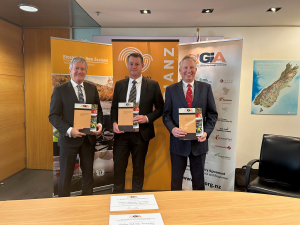MPI defends cost of new biosecurity lab
The head of the Ministry for Primary Industries (MPI) biosecurity operation, Stuart Anderson, has defended the cost and the need for a Plant Healht and Environment Laboratory (PHEL) being built in Auckland.
 PIANZ signs the GIA Deed – from left to right Hon Damien O’Connor (Minister for Biosecurity), Egbert Segers (Chair, PIANZ) and Michael Brooks (Executive Director, PIANZ).
PIANZ signs the GIA Deed – from left to right Hon Damien O’Connor (Minister for Biosecurity), Egbert Segers (Chair, PIANZ) and Michael Brooks (Executive Director, PIANZ).
The Poultry Industry Association of New Zealand (PIANZ) is the latest industry group to sign up to the Government Industry Agreement for Biosecurity Readiness and Response (GIA).
PIANZ represents the interests of approximately 99% of poultry meat producers in New Zealand.
In a signing ceremony yesterday (21 June), attended by Biosecurity Minister Damien O’Connor and senior representatives from the Ministry for Primary Industries (MPI), PIANZ joins 23 other industry sectors that have agreed to work with the Government, and each other, to combat the threat of an incursion of a pest or disease significantly impacting New Zealand’s primary industries.
GIA chair, Dave Harrison, says PIANZ’s decision to join the partnership is welcomed.
“The poultry meat sector is a significant player in New Zealand’s food and fibre sector and an important contributor to the country's overall economic wellbeing,” Harrison says. “It is great that the PIANZ has recognised the benefits of working with other GIA partners to improve biosecurity outcomes,” he says.
Biosecurity New Zealand deputy director Stuart Anderson says he welcomes PIANZ joining the partnership.
“Biosecurity in New Zealand is everybody’s responsibility,” he says.
“We can only deliver a strong, secure biosecurity system in close partnership with industry and other partners. I’m really pleased that the poultry sector has decided to join with us in the GIA, and I look forward to working closely with the sector to improve our biosecurity readiness.”
PIANZ chair, Egbert Segers, says biosecurity is fundamental to the poultry industry as it secures the sector’s reputation for producing safe, healthy, and high-quality products.
“A large-scale biosecurity incursion of a serious bird disease, such as avian influenza or Newcastle disease, could devastate the poultry meat sector,” Segers says.
“Joining GIA to work with the Government on our industry’s biosecurity risks is a fundamental component of our goal of remaining a trusted, economic, and safe source of food for consumers while meeting or exceeding the high standards imposed by regulatory bodies,” he says. “Our major poultry disease-free status is important to our international standing in world poultry.”
“PIANZ is committed to maintaining and improving biosecurity readiness and response standards by working in partnership with the Government and other primary industries,” Segers says.
The Government's chief science advisor, Dr John Roche says the key objective for the science sector in the coming year is bedding down the reforms which sees the merger of the previous entities.
Hawke's Bay apple grower Taylor Corporation says a standout 2026 season, coming after a few difficult years, is boosting optimism among growers.
Horticulture New Zealand (HortNZ) has added its perspective to numerous primary sector voices urging the Government to strengthen its draft legislation to replace the Resource Management Act (RMA).
The Commerce Commission has finalised new information disclosure requirements for local councils and water organisations that deliver water supply and wastewater services.
Beef + Lamb NZ (B+LNZ) is calling for significant changes to the Government’s reforms to the Resource Management Act (RMA).
NZPork says the Government needs to strengthen its proposed planning laws to ensure New Zealand's pig farmers can continue to produce pork.

OPINION: The proverbial has really hit the fan in Wellington and exposed a glaring example of a double standard in…
OPINION: Dark suited spin doctors exist to, well, spin, and the nice cuddly progressive types at Greenpeace Aotearoa practice this…